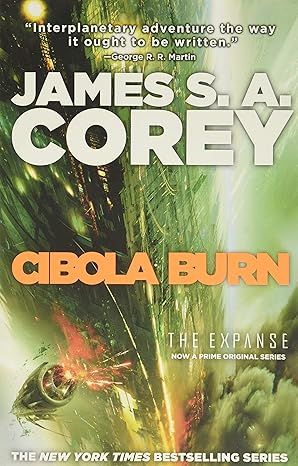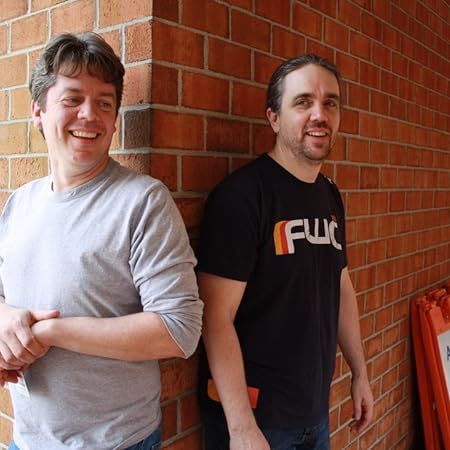Cibola Burn (The Expanse, 4)
4.6 out of 5
33,345 global ratings
The fourth book in the NYT bestselling Expanse series, Cibola Burn sees the crew of the Rocinante on a new frontier, as the rush to colonize the new planets threatens to outrun law and order and give way to war and chaos. Now a Prime Original series.
HUGO AWARD WINNER FOR BEST SERIES
Enter a new frontier.
"An empty apartment, a missing family, that's creepy. But this is like finding a military base with no one on it. Fighters and tanks idling on the runway with no drivers. This is bad juju. Something wrong happened here. What you should do is tell everyone to leave."
The gates have opened the way to a thousand new worlds and the rush to colonize has begun. Settlers looking for a new life stream out from humanity's home planets. Ilus, the first human colony on this vast new frontier, is being born in blood and fire.
Independent settlers stand against the overwhelming power of a corporate colony ship with only their determination, courage, and the skills learned in the long wars of home. Innocent scientists are slaughtered as they try to survey a new and alien world. The struggle on Ilus threatens to spread all the way back to Earth.
James Holden and the crew of his one small ship are sent to make peace in the midst of war and sense in the midst of chaos. But the more he looks at it, the more Holden thinks the mission was meant to fail.
And the whispers of a dead man remind him that the great galactic civilization that once stood on this land is gone. And that something killed it.
The Expanse
- Leviathan Wakes
- Caliban's War
- Abaddon's Gate
- Cibola Burn
- Nemesis Games
- Babylon's Ashes
- Persepolis Rising
- Tiamat's Wrath
- Leviathan Falls
Memory's Legion
The Expanse Short Fiction
- Drive
- The Butcher of Anderson Station
- Gods of Risk
- The Churn
- The Vital Abyss
- Strange Dogs
- Auberon
- The Sins of Our Fathers
624 pages,
Kindle
Audiobook
Hardcover
Paperback
Audio CD
First published May 4, 2015
ISBN 9780316334686
About the authors
James S. A. Corey
James S. A. Corey is the pen name of fantasy author Daniel Abraham, author of the critically acclaimed Long Price Quartet, and writer Ty Franck. They both live in Albuquerque, New Mexico.
Reviews
Jonah
5
Another great addition
Reviewed in the United States on June 30, 2024
Verified Purchase
Cibola Burn is another fantastic addition to the Expanse series. It has the characters we love and puts them in new exciting environs while adding new characters we grow to love and hate.
KP
5
This series just gets better and better
Reviewed in the United States on October 19, 2022
Verified Purchase
Me: "I don't think I can hate a character more than I hated Ashford. Adolphus Murty: "Hold my beer."
It's been about two years since the end of Abaddon's Gate. The gates are opened and now there are thousands of new habitable planets up for grabs and a land rush has begun. Refugees from Ganymede have settled on one of the new planets they've named Ilus. But, when scientists and security forces attempt to land on the planet and claim dominion, things go from bad to worse fast. Holden is tasked by Avasarala and Fred Johnson to keep the peace and they find themselves caught between settlers who are trying to eek out a life in a new place and the company which owns the official claim. When a catastrophic event is compounded by the spread of a deadly disease and Detective Miller is back and need's Holden's help, it's a race against the clock to find a cure and safe everyone.
In addition to Holden, we have 3 new POV characters: Dimitri Havelock who was Detective Miller's partner back on Ceres and is now working for Royal Charter Energy aboard the Edwards Israel. Basia Merton, a welder from Ganymede who lost his son Katoa (who shared a rare genetic disorder with Pax's daughter Mei) who has come to Ilus in hopes of keeping his family safe. And lastly, Elvi Okoye who is a biologist from Earth who hopes to study New Terra, but who finds herself in the middle of a disaster she never expected.
This book is definitely telling a much smaller story; and a very human one. It's full of complicated and imperfect people, most of whom are doing the best they can with the hand they've been dealt. But, it's also about how easy it is to dehumanize your "enemy" in the pursuit of your own goals. And, those who are far more concerned with being right than doing what is right. "There was no point to the attack except spite and the kind of violence that passed for meaning in the face of despair."
Three Things:
- Basia's story broke my heart. I can't imagine the pain of losing a child and then trying so hard to get your family to safety only to end up in another big mess. He made some bad choices - no doubt. But, given his anger and grief I also understand why he made them.
- I really loved all the Holden/Amos interactions we got in this book. "'I also,' Holden continued, 'may have shoved him down and stolen his hand terminal.' 'Stop making me fall in love with you, Cap, we both know it can't go anywhere.'''
- I loved Elvi and Fayez together. In my head, they are living happily ever after and nothing bad is ever going to happen to them again.
This series just keeps getting better and better. I can't wait to see what happens next.
Read more
2 people found this helpful
Joe Karpierz
5
And while science fiction writing today is far superior and much more literary than what it was back ...
Reviewed in the United States on December 12, 2015
Verified Purchase
The Expanse franchise - and make no mistake, it is a franchise - keeps rolling right along. Originally based on a video game, the Expanse now encompasses five novels (as I write this) with another four coming, several shorter pieces of fiction, and as most people know, an upcoming television series on the SyFy channel.
The train just keeps right on rolling, and I think deservedly so. There's a quote from George R. R. Martin on the front cover that says "Interplanetary adventure the way it ought to be written." While that's true, I think the statement could be modified to read "...the way it used to be written". I think a lot of us who have been reading science fiction for a very long time have lost the sense of wonder - probably due to age and becoming jaded more than anything else - and are glomming on to the Expanse as a return to their youth and what turned them on to the field in the first place. And while science fiction writing today is far superior and much more literary than what it was back in its infancy, it's good to go back to the kind of story that we grew up with. But the difference between the Expanse and stuff from the good old days is, in my opinion, the quality of writing. The Expanse is proof that you can have space opera adventure that is well written and that can stand up to the rest of the field.
CIBOLA BURN is the fourth novel in the series, and the first to take place outside the Solar System. The events of ABADDON'S GATE have, well, opened the gates to distant space and the thousands of new worlds that promise a new life for folks trying to start over. The novel takes place on one of these planets. Independent settlers have reached New Terra, and are starting new lives there. Royal Charter Energy, however, is the U.N. sanctioned settler of that planet, and a shuttle is getting ready to land. The settlers blow up the landing pad, taking the shuttle and the lives of several people on it, including that of the assigned planetary governor, with it. And thus, the conflict central to the novel, is set up. The settlers think the planet is rightfully theirs - they got there first and have been setting up their colony. RCE is sanctioned by the government back home, and so it legally claims the planet as theirs.
RCE and its security people view the settlers as terrorists, since many of RCE folks were killed in the shuttle explosion, and use a heavy hand in trying to take control of the planet. The settlers just want to live their lives in peace, but can't since RCE's security goon, Murtry does not hesitate to kill any settler who gets out of line. Things have gotten so out of control that the U.N. sends in a mediator.
What, you were wondering how James Holden and the crew of the Rocinante fit in to this? You mean you can't picture Holden as a mediator? That's alright, no one else can either.
Things don't start well when Holden meets the assembled group for the first time, and it really goes downhill from there. Tensions and violence escalate as neither side will give ground. And then things get worse. While all this action has been occurring, what has been relegated to the background - and maybe even forgotten - is the fact that the race that created the protomolecule (you remember the protomolecule, don't you?), the very race that closed the gates in an attempt to stop the race that was killing them from spreading throughout the galaxy, has a role in this story.
CIBOLA BURN is certainly a planetary colonization adventure story. It's also a study of human perseverance and struggle, and, eventually, of cooperation and compromise in the face of planetary disaster. It's also a story of romance, of family, and of caring people. We've never seen Jim Holden in this light before, trying to be a peacemaker rather than a rabblerouser - and he handles it really well. The rest of the crew of the Rocinante, while not banished to the background, do not play as big a role in this story as they have in the previous three books. But they are there, and they make important contributions. And let's not forget Miller. I'll leave the reader to figure out what's going on with Miller.
CIBOLA BURN is another worthy entry in the Expanse universe, and I'm told that the next novel, NEMESIS GAMES, is even better. I'm looking forward to seeing what Corey has in store for us there.
Read more
John MacEnulty
5
4
Reviewed in the United States on June 9, 2024
Verified Purchase
This series keeps getting better with every book. I’m going to be bummed out when I get to the last one.
Mad Professah
5
Cibola Burn is incredibly suspenseful and exciting (like a really good Western!)
Reviewed in the United States on July 17, 2014
Verified Purchase
The fourth book in The Expanse series by James S.A. Corey, Cibola Burn, was released on June 17, 2014 and I devoured it in three days. Things are going well for Corey right now as earlier this year it was announced that SyFy has decided to make a television series out of The Expanse books, ordering a first season of 10 episodes, describing it as their "most ambitious" series and "Game of Thrones in space." Then, just a few weeks after Book 4 (Cibola Burn) of the series was published, they learned that Book 3 (Abaddon's Gate) won the prestigious Locus Award for Best Science Fiction. Other books that have won the Locus award include classics of the genre like Foundation's Edge by Isaac Asimov, Doomsday Book and To Say Nothing of the Dog by Connie Willis and 3 of the 4 books in the Hyperion cantos by Dan Simmons. Great company! As you can see from my review, Abaddon's Gate is a really good book, but the truth is that Cibola Burn is possibly even better!
Abaddon's Gate is like a roller-coaster, a thrilling ride that ends with an "oh ****!" sequence that completely upends the set of rules we thought the Universe was abiding by, opening up the story to dizzying set of possibilities. Cibola Burn is not as "big" a story as Abaddon's Gate, but it is even more suspenseful (which I did not even think was possible). Cibola Burn is really more like a very good Western. After the events of the previous book (spoiler alert), there are now thousands of star systems, with who knows how many habitable planets, for humanity to expand to. So, basically there is a land rush on, and Cibola Burn is set on Ilus, one of the first planets that has been colonized by former Belters (people who were born and raised in space, in the Asteroid Belts). However, a mega-corporation named Royal Charter Energy who gets a charter from the United Nations to explore the planet (which they call New Terra) and its resources (especially it's very import lithium deposits). But by the time the RCE ship gets there, Belter colonists have been there for more than a year and someone plants a bomb and destroys the landing pad, damaging the main shuttle, killing the official UN representative (and most importantly) preventing RCE from getting a secure foothold on the planet.
Because even the fastest ship would take the better part of a year or more to get to the planet (and even signals from Earth take several hours to be transmitted), the humans are on their own trying to settle what is essentially a property dispute in a jurisdiction where the rules are "TBD." This is basically a wild, wild west scenario. So, how will humans in the future advanced civilization deal with an uncivilized situation rife with conflict?
This is the powder keg that Corey has set up as the primary explosive force behind the plot developments. For the first time in the series, the entire book basically deals with problems pertaining to one planetary system. Although there's also a bunch of new characters, the people we have been following for four books: James Holden (captain of Rocinante), his lover (and Rocinante executive officer) Naomi Nagata, pilot Alex Kamal and chief engineer Amos Burton return and we get to learn a lot more about them. My favorite character in the series, Chrisjen Avarasala (the profane grandmother who basically is the most powerful person on Earth), has a too-brief cameo in the Epilogue chapter along with Bobbie Draper, the huge female Marine who is so important in Caliban's War.
In addition to these characters, there are new people in the story who we get point-of-view chapters from: Basia (a Belter colonist on Ilus who is a father of two teenagers a bit over his head), Elvi (a Earther scientist who is sent by RCE to investigate alien life on the planet and finds herself the subject of one of her own experiments) and Havelock (an Earther who is working in the security department on the RCE ship and has appeared in previous books in the series in more limited fashion). Of these my favorite was Elvi (demonstrating once again that the all-male duo that is James Corey can fully realize female characters with the best of them!) However, the most memorable new character is the villainous Adolphus Murtry, the chief of security on the RCE ship and who turns out to be a psychopath).
Amazingly, Holden is sent to Ilus to serve as a United Nations representative to mediate between two groups of people who feel like they can basically justify any action if it leads to their desired result of control over this new planet. Since we know from the first three books in the series that Holden is pretty headstrong himself (and diplomacy is not his strong suit) it should not come as a surprise that the situation on Ilus/New Terra (the warring factions can't even agree what to call it) goes from bad to worse. And then the crazy alien stuff starts happening.
In my opinion, Cibola Burn is the best story in the series so far. It is incredibly suspenseful and exciting. However, in terms of the overall Expanse series there is not much development in answering some of the larger questions of the series (except one very big event that happens towards the end of the book that I will not spoil for you here except to say that it involves the protomolecule from Leviathan Wakes) and that is somewhat disappointing but frankly I was so gripped by the overall story that I absolutely devoured the book (which is not small) in roughly two days of reading.
The only bad thing about finishing this book so quickly is now I have to wait almost an entire year until Book 5 comes out. But I am cheered by the news that the series has been expanded from the original trilogy to nine books. Let's hope the SyFy television series will be as successful!
Title: Cibola Burn. Author: James S.A. Corey. Paperback: 592 pages. Publisher: Orbit. Date Published: June 17, 2014. Date Read: June 20, 2014.
OVERALL GRADE: A/A- (3.83/4.0).
PLOT: A. IMAGERY: A-. IMPACT: A-. WRITING: A.
Read more
7 people found this helpful
H. Grove (errantdreams)
5
Still loving this serise!
Reviewed in the United States on June 30, 2021
Verified Purchase
James S.A. Corey’s “The Expanse” series is such an amazing science fiction tale (with a touch of horror). Cibola Burn (The Expanse, 4) makes it clear that each of these books is just as good as the previous, and that’s a hard thing to pull off.
When we left off at the end of Abaddon’s Gate, the gates had opened up and made more than a thousand habitable worlds available to humanity. On one of these planets, colonists have cobbled together a settlement (they call the planet Ilus) and are mining valuable minerals. The company Royal Charter Energy, however, received a charter from the UN granting them ownership of the planet. They’ve sent a ship full of scientists to start studying the planet (which they call New Terra). Basia Merton has been convinced by some of his fellow colonists to blow up the landing pad that RCE needs in order to send their scientists down to the planet. Unfortunately, the drop shuttle gets caught in the explosion and some of the scientists die, while others are injured. Immediately the colonists and RCE are set against each other, and the psychotic head of security for the RCE vessel (Adolphus Murtry) is determined that his side will win at any cost. Havelock, Miller’s one-time partner, is working security on the RCE vessel, and the UN sends Captain Holden to Ilus to mediate some sort of solution to the dispute. As if this weren’t bad enough, as soon as Holden’s ship arrives, defunct alien machinery on the planet starts to come alive–and some of it is quite dangerous. Even Miller’s ghost has followed Holden to Ilus, and he too wants Holden’s help.
The mystery of Ilus is fascinating. A geologist on the RCE mission feels like he has nothing to do because, in his words, the planet was “machined.” It was designed, and the regularly-spaced moons around it are clearly meant to serve some function as well. The first encounter with anything alien was the protomolecule and the horror show it made of Eros. The second was the Ring and the station Holden discovered on the other side. Now we get to see an actual planet that the aliens inhabited, complete with alien ruins. There are some organisms there–flora and fauna–and some of them are eerily dangerous. The alien equipment is also quite capable of causing damage as it “wakes up.” Miller is trying to figure out what happened to the aliens, and pushes Holden to look into that when Holden really just wants to keep people alive.
There are some great characters on every side in this dispute. Elvi, a biologist, is trying to study the native lifeforms, but gets roped into doing entirely more urgent things (she also has a serious crush on Holden). Fayez, the geologist, is doing his best to feel relevant. Havelock is left up on the RCE vessel and ends up training a “militia”–yeah, that doesn’t go as planned. Basia is hauled off to the Rocinante as a prisoner, which is really Holden’s attempt to keep him from getting killed by Murtry. Absolutely no one wants to listen to Holden, particularly Murtry.
Don’t worry, there’s still plenty going on at the ships–the Rocinante (Holden’s ship), the RCE vessel, and the Barbapiccola (the ship that transported the colonists and is supposed to take their ore to sale). Between Havelock’s militia, Murtry’s orders, and Holden’s people, there are plenty of unfortunate things happening up there. And when enough alien equipment wakes up to put the ships’ reactors offline, their orbits start to decay. The amount of stuff going wrong is epic, and it makes for a tense, tightly-plotted story.
I also liked the fact that there’s a little bit of nudging at the idea that these new worlds are going to have a huge impact on the economic and political landscapes that humans rely on. I can’t wait to read book five and see where that goes!
Read more

Skuldren
5
Sci-Fi Escapism at it's Best
Reviewed in the United States on July 21, 2014
Verified Purchase
"Whatever had built the protomolecule and fired it toward Earth back in the depths of time wasn’t answering calls anymore. The bridge builder had opened the way, and no great gods had come streaming through." -Cibola Burn
If you’re a fan of The Expanse series, then you may breathe a sigh of relief in knowing that Cibola Burn is another great book. It has intriguing characters, fanciful landscapes, mysterious alien technology and gripping drama, all of the ingredients you need for some excellent escapism. In this chapter of the adventure, humanity finds itself quarrelling over a newly discovered planet rich in ore and ripe for exploration. As usual, James Holden and his crew find themselves in the middle of things as all hell breaks loose. A journey to colonize a new world turns into a struggle between civilization and the rough reality of the wild frontier. When governments are a year away, the line between justice and tyranny can become a very thin line.
The storyline for the book is pretty simple. Refuges sneak through the ring and find a habitable planet which they decide to call home. Meanwhile, the UN gives the mineral and exploration rights of the planet to a corporation called Royal Charter Energy. When RCE finally arrives after their long journey through space, they’re met by violence. Radicals among the colonists are met by hardline RCE security forces willing to match violence with violence. As the issue escalates, James Holden is brought in to mediate the situation and try to avert a crisis. Making things even more interesting is the strange, alien technology on the planet that has a mind of its own.
Returning to this book are the core characters: James Holden, Naomi Nagata, Amos Burton and Alex Kamal. As tension brews between the colonists and the RCE scientists, engineers and security forces, Holden must try to de-escalate things before they get out of hand. He and his crew get involved in skirmishes and standoffs which raises the stakes. However the real game changer is the alien technology on the planet. While Holden is fighting fires between the humans, the protomolecule resurrection of detective Miller is still hard at work trying to find the killers of an ancient galactic civilization. As Miller describes it, the planet they’re on is a crime scene, and somewhere is a clue to finding the killer.
“You mean like that?”
Miller shifted, alien eyes moving their lenses in the complexity of the mechanism. “Like what?”
“That. In the middle of the room. That.”
“I don’t see anything,” Miller said. “What’s it look like?”
“The eye of an angry God.”
Like the previous books in the series, there’s a nice influx of new characters to spice things up. Basia Merton is a family man, a refugee, and one of the colonists on the planet Illus. He’s also a terrorist. Elvi Okoye is a naive yet brilliant scientist who struggles to separate the wonders of her own little world from the reality she is surrounded by. The head of the RCE taskforce security is a man named Murty who is willing to go to the utmost extremes to accomplish the mission entrusted to him. Then there’s a familiar character we haven’t seen much of, Miller’s old partner Dimitri Havelock. Havelock is part of the RCE security force, which also places him in between duty and insanity. Like everyone else, he must determine the difference between doing his duty and doing the right thing.
What makes this book great is a combination of several key factors. First off, Daniel Abraham and Ty Franck (aka James S.A. Corey) have great prose. The descriptive language of their storytelling is just a joy to read. Secondly, there’s deeply intriguing characters who are fleshed out with motivations, faults and twisting journeys that lead them along paths of character growth. The final ingredient is the emotional teeter tottering of escalating plot. The way the story ebbs and flows with conflict and resolution keeps the story engaging and tense. Just when the characters get the problem fixed, a new one arises that’s even more frightening than the last. The entire adventure becomes a skillful dance between despair and relief.
If you haven’t read any of the other books yet in this series, this certainly isn’t the place to jump in. However, if you’ve been reading the series so far, Cibola Burn is another fun chapter to dive into. Holden and his crew get into another mess and drag all the readers along for the ride. The new characters fill out the story with unexpected possibilities and viable threats. Plus the story ends with a great hook for the next book. While the SyFy channel may be turning this series into a television show, I’m not holding my breath for it to come anywhere near the greatness of the books. For readers, this is the stuff we live for, vivid escapism, and James S.A. Corey do a terrific job at it. I give Cibola Burn a five out of five for continuing to fill that joy of escapism.
Read more
2 people found this helpful
AustinTiffany
4
Mostly Good, a Little Hard to Follow
Reviewed in the United States on July 10, 2014
Verified Purchase
The 4th installment in the Expanse series maintains the same general themes and style of the previous 3 books, so I'll cut my review a little short by saying that if you've read those books, then not much in this book demonstrates a departure from the method used so far. Although, if you HAVEN'T read the previous 3 books, Cibola Burn is still relatively easy to drop into ... that said, still go read the other 3 books first.
Anyway, Cibola Burn's biggest shift is place setting. While a lot of action, as always, still occurs aboard space ships and in null-g environments, a good portion of this story takes place on an honest to God planet (as opposed to asteroids or small moons, as was the case in previous books). And of course, as would be fitting, the story ends up drawing strong parallels between the Old Wild West and the colonization of this new planet. These similarities are hardly accidental, and the author makes it clear in several instances that both he and the characters in this story are cognizant of these elements. And this is a good thing. Between that and the not-so-easily-missed similarities between James Holden and Malcom Reynolds, as well as Amos Burton and Jayne, the story, for me at least, roused up a strong impression of "Firefly" in my mind. Throw in some sharp, witty banter between Holden and Amos, and it's like Wheddon was a co-author.
But this is a lengthy book, and between the space ships, the cold war between three different factions trying to claim a new (nearly) virgin planet, and lots of spooky alien relics, the story goes way beyond just Wild West in space. Even then, though, as is the case with each of the Expanse books, the events force the various characters to explore some weighty ethical, political, historical, and philosophical material. I liked those parts quite a bit, especially since they tended to be spaced out just right in a way to allow the plot to keep moving, while also giving it meaning and substance and intelligence.
As was the case with the other 3 books, however, I can't give this book 5 stars. Ironically, the same things that make these books so grounded and realistic is also the same thing that makes it drag a bit and sometimes (literally) gives me a head-ache: the extremely accurate and well-thought out physics in null-g. For anyone who hasn't watched a thousand simulations of null-g physics, or actually been in space, or at least taken a ride on the Vomit Comet (the plane, not a roller coaster or something), then the descriptions in this book concerning some of the space-based scenes will probably be at least confusing if not down right impossible to imagine. And trying to keep track of some of the principles across the entire book is hard. The author seems to be a bit more aware of this here than in previous books, since he makes mention of certain things several times to help keep it clear (IE, pointing out that when the ship lands on a planet, up-down is now different inside of a ship, and walls are now floors). However, keeping all this straight is taxing. And trying to imagine a lengthy scene between two different ships, people on space walks, a cable-tether, missles, and an escalating scenario of life and death? Forget about it. Please mail me a CG simulation of it.
The second gripe I have about these books is sometimes confusing continuity. As always, the chapters bounce back and forth between 3 or 4 different perspectives (where each chapter in its entirety is from one perspective, then the next chapter is from a different one, etc). That's a fine literary style to take, but the author here tends to do a multi-week or multi-month leap forward in time between chapters without clearly indicating it until pages later. Not always, but enough to be frustrating. I'd prefer a time-stamp of some kind on each chapter to help with that. The worst instance is in one of the last chapters, where a combination of odd phrasing, vague pronoun usage, and no time scale indication resulted in me having to back up several pages, re-read everything, and then understand that a flash-back of sorts had occured without clear indication. And on a final note, the author tends to be rather vague with some of his descriptions. Oftentimes he will provide a definitive measurement of size or a simile for appearance, but other times it's just a quick "it's like an insect" or "it has many appendages" or "machine-like".
Final word: it's a good book worth a read, and any fans of the Expanse series will find this book to be remarkably consistent in style with the previous 3 installments.
Read more
Bryan Desmond
4
They have built something here that feels plausible, relatable, and leaves a reader eager for more.
Reviewed in the United States on February 5, 2019
Verified Purchase
These guys know how to end a book. Ty Franck and Daniel Abraham, together James S.A. Corey, really lay it on at the end of these Expanse installments; they get me excited every time to continue and see what happens next (though I've been disciplined in not tearing through these too quickly), and I almost always guess wrong, or at least make an inaccurate assumption. Cibola Burn is a great example of this.
When Abaddon's Gate ended, I expected what came next to be unimaginably grandiose and epic. I'm wondering if my high expectations led me to my first four-star rating for the series. Without spoiling anything, I had unrealistic expectations of the story after the implications that the end of book three held. What I got, understandably so, did not quite meet those expectations, but damn it was a good story. Like all of the books before it, the crew of the Rocinante hovers in the heart of matters. Part of the fun of beginning each new installment is theorizing on how Holden, Naomi, Amos, and Alex will play their part. I've grown to love each of those crew mates, and am deeply invested wherever they choose to appear. The other part of the fun is the new characters. This time Elvi, Havelock, and Basia (though these last two are actually not quite new). The authors also manage to tease us with just one chapter each from Bobbie and Avasarala; both of whom I miss. I think we may see more of both of them in the future though, based on that ending..
This next bit will hold very minor spoilers for the series, so beware if you're aiming for total blindness (no pun intended).
Cibola Burn begins around two years after the events at the end of Abaddon's Gate, and largely deals with the repercussions of a mad dash to the planet New Terra (or Ilus, depending on who you ask), a new frontier for humanity. The situation on the planet grows complex when squatting Belters are forced to deal with Earth corporation Royal Charter Energy, who technically has rights to the planet. Enter our 'new' characters. Elvi is a biologist working for RCE who has decided to make the year and a half long journey to New Terra in the name of scientific discovery. Her infectious passion to see and document an entirely new biosphere is a joy to read. Havelock (formerly the partner of Miller, if you can remember all the way back to book one) is assisting RCE's security chief, Murty. He's a loyal man, and wants nothing more than to keep safe the citizens who have made this long trek. Basia is one of the Belters who were the first arrivals on Ilus. We know him from a brief interaction in book two. He has brought his family to a new planet seeking a fresh start, and to escape the pain of losing his son when things on Ganymede went bad.
As I've not doubt mentioned before, the authors' skill shines in their characters and dialogue. Each of them feels real, and behaves as a real person would. It's easy to get invested in their stories for this reason alone. And if you are imagining that a situation like the one on New Terra between the squatters and RCE is ripe for conflict, well, things can get much, much worse. It turns out that opening up gateways to a thousand new worlds is not enough to escape the influence of the protomolecule and its creators; nor, for that matter, the entity that chased it away..
All in all, this was another great installment in an excellent series. One that I've had a lot of fun reading. Ty and Daniel have built something here that feels plausible, relatable, and leaves a reader eager for more. I will continue to put a little break between installments (so as to line up my reading with the release of the final novel), but I'm already looking forward to Nemesis Games.
Read more
2 people found this helpful
All_Write
3
Strong Start, Weak Finish, and a Murky Middle…as seems usual
Reviewed in the United States on April 10, 2023
Verified Purchase
So, this is my first review ever…take it for whatever it is worth.
After finishing four books in this series, I have to say my interest is flagging. I don’t know how accurate the science is—space travel time, Gs of acceleration, communication lag, etc.—but apart from those elements, which seem [to me] to be strong (seriously, I love them!), the authors of this series have little patience for mundane things like character consistency, timeline harmony, world-building-spatial-description (I’m talking about describing things like populations, not physical structures) and just sheer realistic thinking.
In this book, you have a purely scientist based population on one ship, which is radicalized and militarized, with almost no prompting, to the point they ignore basic reason and logic, as they seek to kill others.
You have Doctors, both Medical and Scientific, that overlook an obvious and specific, outlier detail, when a plague is threatening to wipe out a fledgling colony, in favor of obscure medical analysis of one character’s genetic makeup.
And you have an entire planet of ancient alien technology that is completely decrepit to the point it is 99% useless and inoperable…oh, except for the defense grid [again—see 3rd book] which can shoot down ships or even bullets with 100% lethality, while simultaneously negating the laws of physics, rendering nuclear fusion reactions, inside the cores of radiation shielded ships, impossible.
The uniqueness is there. I love the concept of the protomolecule—what it does and how it works. The characters can be endearing. And I do enjoy the mystery, and I enjoy the rhythm and general composition of the prose, but after 4 books, the authors seem to be trying too hard to make their characters sound smart, their world seem complex (scientifically), and it is coming at the cost of the story telling.
The POVs jump around at random and linger on things that have little relevance. Details are included or crafted for no reason other than adding tension (because it’s not being woven into the narrative organically—looking at you death slugs). And the denouements seem like pure after thoughts—don’t believe me, look at the structure of Havelock’s POV in chapter 55 or 56, it opens with Havelock on the planet, shifts to him off the planet, but before he was ever on it, then shifts back to him on the ship [I think] after leaving the planet [again…I think]. And it doesn’t offer any definite resolution to the story’s colonist plot-thread, or Basia, or Felcia.
I’m just not sure how I feel about these books. There is clear signs of greatness sandwiched between tons of intro-level, college creative writing mistakes. It is so frustrating…I don’t know what to think at this point.
Read more
2 people found this helpful
Top James S. A. Corey titles
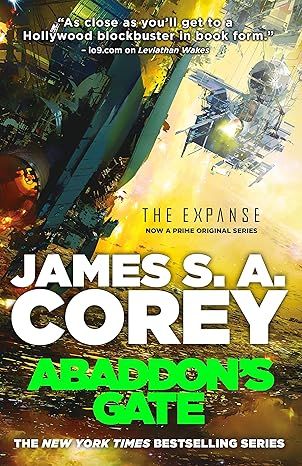
Abaddon's Gate (The Expanse, 3)
4.6
-
34,117
$11.99
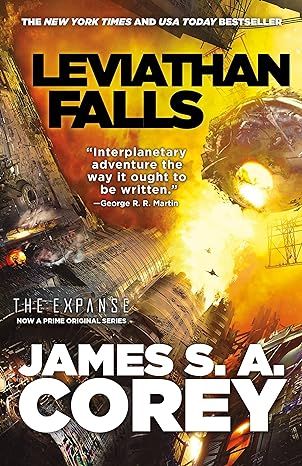
Leviathan Falls (The Expanse, 9)
4.8
-
25,849
$11.99
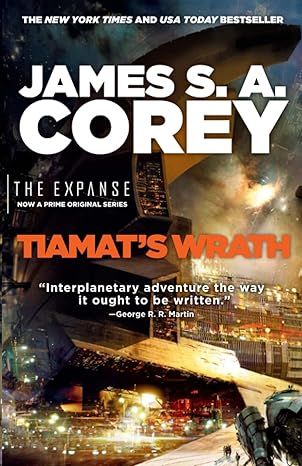
Tiamat's Wrath (The Expanse, 8)
4.8
-
27,918
$11.99
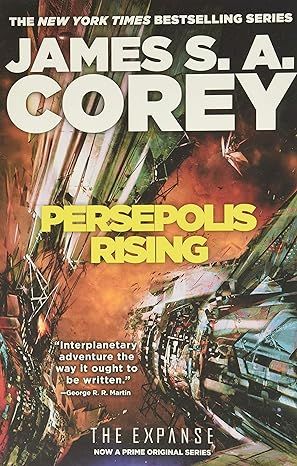
Persepolis Rising (The Expanse, 7)
4.6
-
25,957
$11.99
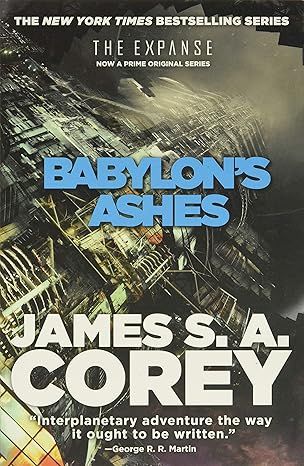
Babylon's Ashes (The Expanse, 6)
4.5
-
29,838
$11.99
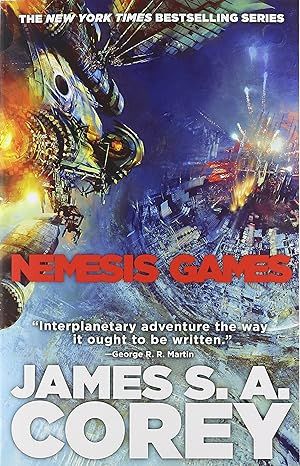
Nemesis Games (The Expanse, 5)
4.6
-
32,883
$11.99
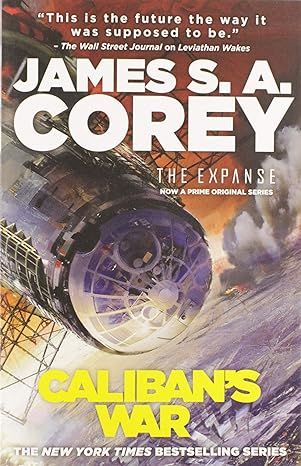
Caliban's War (The Expanse, 2)
4.7
-
37,849
$12.92
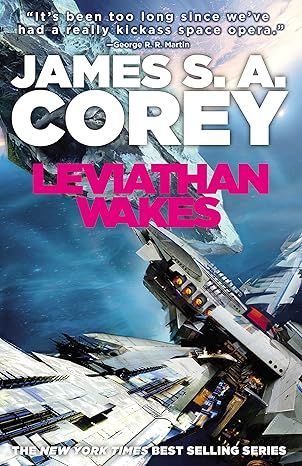
Leviathan Wakes (The Expanse, 1)
4.6
-
52,335
$11.24
Best Sellers

The Tuscan Child
4.2
-
100,022
$8.39

The Thursday Murder Club: A Novel (A Thursday Murder Club Mystery)
4.3
-
155,575
$6.33

Sapiens: A Brief History of Humankind
4.6
-
140,302
$13.49

The Butterfly Garden (The Collector, 1)
4.3
-
88,556
$9.59

Things We Hide from the Light (Knockemout Series, 2)
4.4
-
94,890
$11.66

The Last Thing He Told Me: A Novel
4.3
-
154,085
$2.99

The Perfect Marriage: A Completely Gripping Psychological Suspense
4.3
-
143,196
$9.47

The Coworker
4.1
-
80,003
$13.48

First Lie Wins: A Novel (Random House Large Print)
4.3
-
54,062
$14.99

Mile High (Windy City Series Book 1)
4.4
-
59,745
$16.19

Layla
4.2
-
107,613
$8.99

The Locked Door
4.4
-
94,673
$8.53
